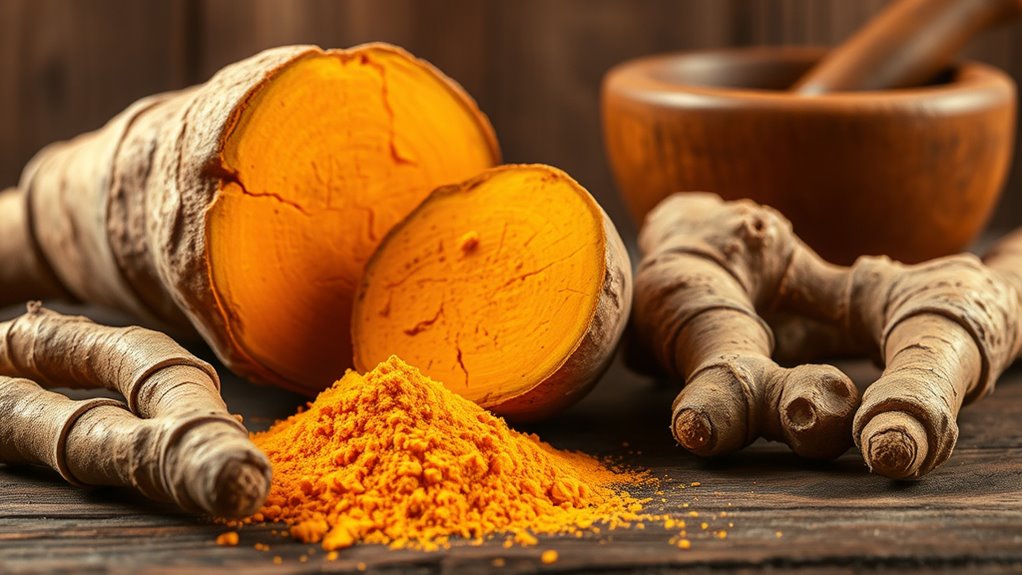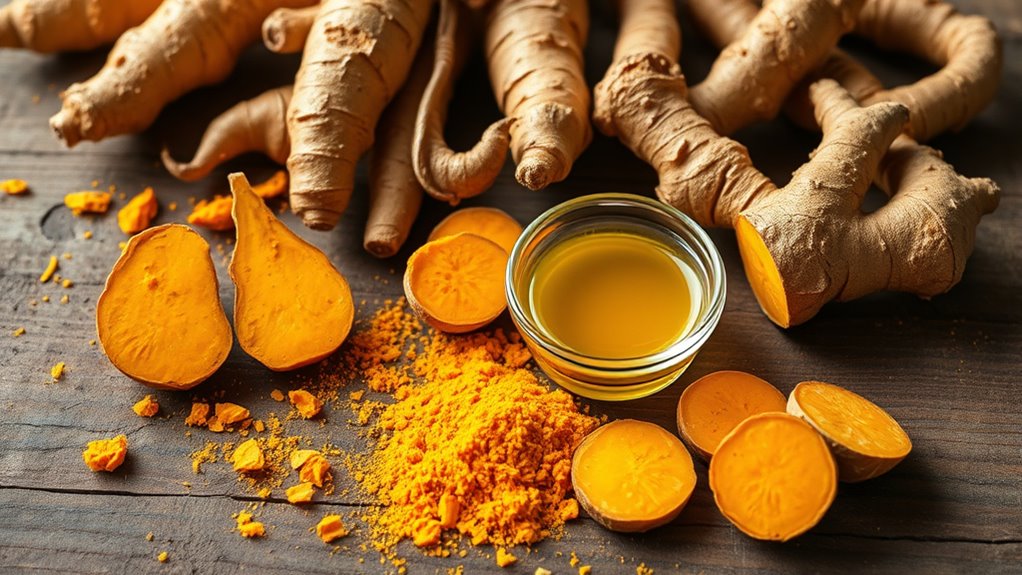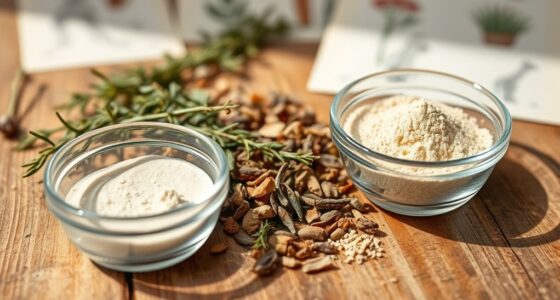Turmeric can support your bone health by reducing inflammation that causes joint pain and cartilage breakdown. Its active compounds stimulate cartilage repair and boost tissue regeneration, aiding in recovery from injuries or degenerative issues. Plus, turmeric’s antioxidant effects help combat oxidative stress, making your bones stronger and more resilient. Incorporating turmeric into your diet or supplements can be a natural way to enhance joint comfort and promote healing—discover how it works for your bones as you explore further.
Key Takeaways
- Turmeric’s anti-inflammatory properties help reduce joint and bone discomfort, supporting overall bone health.
- Its compounds stimulate cartilage cell activity, aiding in cartilage repair and regeneration.
- Turmeric provides antioxidant effects that combat oxidative stress, strengthening bones over time.
- Incorporating turmeric into your diet may promote tissue regeneration and support healing processes.
- When combined with black pepper or fats, turmeric’s absorption is enhanced, maximizing its bone-healing benefits.

Have you ever wondered if a simple spice like turmeric can benefit your bones? It’s a common question, especially when you’re looking for natural ways to support bone health and healing. Turmeric, known for its vibrant yellow color and culinary uses, actually contains powerful compounds called curcuminoids, which have been studied extensively for their anti-inflammatory benefits. When it comes to bones, inflammation is often the root cause of discomfort and damage, so anything that can reduce inflammation is worth considering.
One of the key reasons turmeric is gaining attention for bone health is its ability to combat inflammation. Chronic inflammation can lead to the deterioration of cartilage, the flexible tissue that cushions your joints and bones. By incorporating turmeric into your diet, you may help lessen this inflammation, which is vital for preventing conditions like osteoarthritis and supporting the repair process after injury. The anti-inflammatory benefits of turmeric don’t just relieve pain; they also promote a healthier environment within your joints, potentially slowing down cartilage breakdown.
Turmeric reduces inflammation, helping prevent cartilage breakdown and support joint health.
But turmeric’s role goes beyond just reducing inflammation. Research suggests that it can actively contribute to cartilage repair. This means that, rather than merely alleviating symptoms, turmeric might help repair existing damage in your joints. This is especially promising if you’re recovering from an injury or dealing with degenerative issues. The bioactive compounds in turmeric stimulate the activity of cells involved in cartilage regeneration, encouraging your body to repair and rebuild damaged tissue. This dual action—reducing inflammation and promoting repair—makes turmeric a compelling natural option for supporting bone integrity.
Moreover, turmeric’s benefits extend to overall bone health by helping to maintain the balance between bone formation and resorption. Its antioxidant properties combat oxidative stress, which can weaken bones over time. When your bones are exposed to less oxidative damage, they’re better equipped to stay strong and resilient. While turmeric shouldn’t replace medical treatments, it can be an effective supplement to a balanced diet and healthy lifestyle aimed at preserving bone density and strength.
Incorporating turmeric into your daily routine is simple. You can add it to soups, smoothies, teas, or even take it as a supplement. Just keep in mind that curcumin, the active compound, is best absorbed when combined with black pepper or fats. So, a pinch of black pepper or a splash of oil can enhance its benefits. Overall, using turmeric for its anti-inflammatory benefits and cartilage repair properties can be a natural addition to your efforts in maintaining healthy, strong bones.
Frequently Asked Questions
Can Turmeric Replace Conventional Bone Healing Medications?
You can’t rely solely on herbal alternatives or natural remedies like turmeric to replace conventional bone healing medications. While turmeric offers anti-inflammatory benefits and supports recovery, it isn’t a substitute for medical treatments prescribed by your healthcare provider. Always consult your doctor before replacing or supplementing your prescribed medications with natural remedies. Combining conventional treatments with herbal options might improve healing, but never skip professional advice for proper bone care.
What Are the Optimal Turmeric Dosages for Bone Health?
When considering turmeric for bone health, you want to follow proper dosage guidelines. Typically, supplement formulations suggest 500-2,000 mg of curcumin daily, divided into doses. It’s essential to read labels carefully and consult your healthcare provider for personalized advice. Keep in mind that bioavailability varies, so combining turmeric with black pepper or fats can enhance absorption, maximizing its potential benefits for your bones.
Are There Any Side Effects of Long-Term Turmeric Use?
You might think turmeric’s a miracle cure, but long-term use isn’t entirely risk-free. While turmeric safety is generally good, overuse can lead to side effects like stomach upset, blood thinning, or allergic reactions. The long-term effects remain unclear, so moderation is key. If you plan continuous use, it’s wise to consult your healthcare provider to avoid any unforeseen issues. Remember, even natural remedies have their limits.
Does Turmeric Interact With Osteoporosis Medications?
You should know that turmeric can interact with osteoporosis medications, affecting their effectiveness. These herbal interactions may either enhance or diminish medication action, so it’s important to consult your healthcare provider before combining them. For supplement safety, avoid self-medicating with high doses of turmeric, especially if you’re on prescription drugs. Your doctor can help you determine safe use and prevent any adverse effects from potential herb-drug interactions.
How Quickly Can Turmeric Improve Bone Regeneration?
Wondering how quickly you can see results? Turmeric’s role in bone regeneration depends on your body’s healing timeline and consistency. While some studies suggest anti-inflammatory effects may support healing within weeks, full bone regeneration often takes months. You might notice minor improvements early, but patience is key. Keep in mind, turmeric supplements should complement, not replace, medical treatments, and always consult your healthcare provider for personalized guidance.
Conclusion
Think of turmeric as a gentle gardener tending your bones, nurturing them back to strength with each sprinkle. Just like a gardener tends a fragile plant, you can support your bones’ healing process naturally. While it’s not a magic cure, incorporating turmeric is like giving your bones a boost of sunlight and care. Trust in this nurturing ally to help your bones rebuild and flourish, turning a rough patch into a thriving garden of strength.










